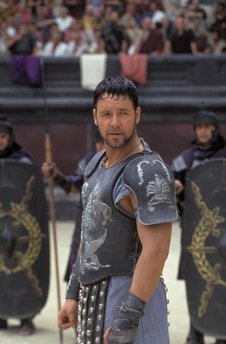5 most captivating Russell Crowe performances
Updated: 2010-11-19 08:35
(Agencies)

LOS ANGELES – Russell Crowe digs deep and transforms himself for every role he takes on, making decent movies better and great movies excellent. He's so consistently good, even some off-camera antics from time to time don't become a distraction; he never fails to convince us.
With the opening this week of "The Next Three Days," here's a look at Crowe's five most captivating performances:
• "L.A. Confidential" (1997): He'd made a name for himself already in Australia with 1992's "Romper Stomper," but this is the role that made Crowe famous in America. As the beefy Detective Bud White, he's got a mean streak, but for all the right reasons: He brutally avenges the abuses suffered by battered wives. He reveals his tortured, tender side in his scenes with Kim Basinger, an Oscar-winner for her portrayal as a Veronica Lake look-alike prostitute. All the characters and motivations are complex in Curtis Hanson's intense, visceral noir, but Bud White oozes moral ambiguity, and Crowe never makes him anything less than fascinating to watch.
• "The Insider" (1999): Crowe earned his first Academy Award nomination, for best actor, for playing Big Tobacco whistleblower Jeffrey Wigand. Michael Mann's smart, suspenseful depiction of real-life events also required Crowe to pack on the pounds, and he steals the show from co-star Al Pacino as a "60 Minutes" producer_ no easy feat — with his measured performance as a conflicted Everyman. Wigand is tormented by his knowledge of the danger of tobacco but compelled by a nondisclosure agreement to keep his mouth shut, and Crowe plays his ethical dilemma with quiet moodiness.
• "Gladiator" (2000): A physical and emotional shift in the opposite extreme for Crowe. In Ridley Scott's historical epic, he's muscular, fierce and intimidating as Roman general Maximus. This is the role that earned him his best-actor Oscar — and the film won five total, including best picture. It's an enormous, CGI-heavy spectacle, old school in tone but high-tech in its visual trickery. For the most part the film feels silly and over-the-top, mindless and empty, but Crowe grounds it by believably conveying his character's remorse. While his low rumble of a gravelly voice provides some gravitas, Crowe also gets to scream. A lot.
• "A Beautiful Mind" (2001): Crowe's transformation into tortured math genius John Forbes Nash Jr. is stunning — reminiscent of the one he'd pulled off two years earlier in "The Insider," but even more effective because Nash's story is so much more personal. It's almost too bad that he won the best-actor Oscar for "Gladiator," because he deserved the award even more for his work here. Aging on screen over a period of nearly 50 years, Crowe turns Nash from a swaggering genius to a shaken shell of a man, and the disintegration is believable and compelling. Prior to "Frost/Nixon," this was director Ron Howard's crowning achievement.
• "3:10 to Yuma" (2007): The original 1957 Western didn't need to be remade, but director James Mangold not only remains true to its roots but expands on them in ways that are thrilling and thoroughly entertaining. Crowe, as the dangerous Ben Wade, does whatever he wants, whenever he wants. He comes off like a gentleman, quoting scripture and drawing detailed sketches of the various people he meets on his travels. But he's still a killer through and through, and Crowe, with his infinite capacity for both charm and darkness, reveals all the colors of his character's personality subtly, brilliantly. His mano-a-mano verbal sparring with fellow heavyweight actor Christian Bale, as the rancher tasked with escorting Wade to the train that'll take him to prison, is a joy to watch.
Paper's Digest

Shaolin Kungfu
Shaolin Temple charts aggressive expansion plan to cash in on demand for kungfu.
Living 'IT' up
Father of pinyin
Touch and go
Specials

China Daily in Europe
China Daily launched its European weekly on December 3, 2010.

Hu visits the US
President Hu Jintao is on a state visit to the US from Jan 18 to 21.

Private Detective
Firms chart new strategies as tighter rules make information gathering tougher.
